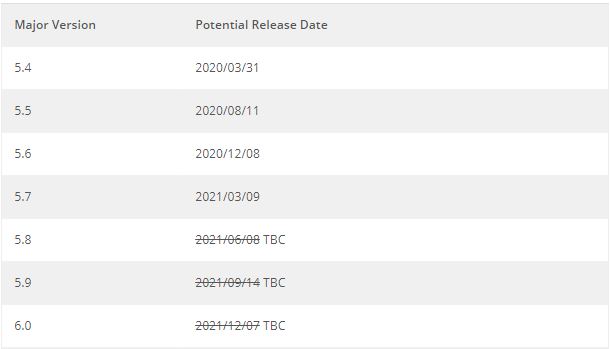WordPress Contributors Discuss Scaling Back Releases: “4 Major Releases Is Not a Viable Plan in 2021”
관련 글: ‘6월에만 가능’ 연인과 함께 체리 따면서 데이트 즐길 수 있는 스폿
WordPress contributors are considering scaling back the planned number of releases in 2021. In a post titled “Making WordPress Releases Easier,” WordPress’ Executive Director, Josepha Haden Chomphosy summarized three years of research on reducing the effort required to have a successful WordPress release:
From my research, the work to automate what we can (and potentially get the project ready for more releases per year) would take 3-4 dedicated developers who are proficient in our backend tools/infrastructure, at least a project manager, 1-2 internal communications people, and probably a year or more of work (if we had all the resources, and they were working at full capacity). This means that 4 major releases is not a viable plan in 2021.
Haden Chomphosy cited a number of challenges, including update fatigue, risk of contributor burnout, a lengthy onboarding process for contributors skilled at doing the administrative work required during a release, and a lack of seasoned core developers to keep the process moving efficiently. She identified a few improvements that could be made in the short-term to improve the experience (mentorship, triage, feature proposals, and better product/processes) but other necessary updates to automation and scaling contributors could take a year or more of work.
is open for feedback but the decision to scale back the releases seems to have already been made. Ryan McCue, Director of Product at Human Made, commented with concerns about altering the predictability of WordPress releases and introducing what seems like a last minute change:
The predictability of the release calendar was a major step forward for the project, and for companies and teams (including mine) building on top of core. We have intentionally planned and structured our year ahead with this calendar in mind. Obviously, due to the tentative nature, we weren’t expecting dates to be final, but the overall picture seemed to be fairly clear with smaller shifts expected.
Whether WordPress does one release or twelve a year doesn’t matter hugely to me, but ensuring it’s predictable matters hugely for our planning, communication with clients, and for our day-to-day processes. Seeing this change pretty last moment is not encouraging, and is going to have real repercussions for us.
관련 글: Nic Carter: ‘If You’re Not Radicalized, You’re Not Paying Attention’
I sympathise with and understand the limitations of capacity and overhead of releasing more often, but changing this plan needs to be clearly communicated upfront, and with a clear plan that isn’t going to change again.
Haden Chomphosy responded with clarification on the conclusion communicated in her post. Without in-person events, contributors have struggled to keep the project moving at the same pace as before. She said the previous schedule had been made without much input from the contributors who are the most impacted.
“Perhaps the more appropriate way to have stated my conclusion would have been: ‘Barring any major changes to the available contributors and global circumstances, I don’t see how we can ship four releases this year without creating undue strain on the team who currently runs those processes,’” Haden Chomphosy said.
Component maintainers and theme/plugin developers participating in the conversation also confirmed that WordPress’ frequent updates have posed a challenge and that the risk of burnout is real. Entering into year two of a global pandemic has undeniably impacted contributors’ availability and momentum, and Haden Chomphosy’s post seeks feedback on a way forward that will avoid putting WordPress’ dedicated contributors under additional strain.
After this post was published, the release schedule for 2020/2021 was updated to show that release dates for WordPress 5.8 and beyond are yet to be confirmed.

Some stakeholders will undoubtedly be disappointed with the current lack of certainty on release dates for the upcoming year, but the conversation is still open and changes will be communicated as soon as contributors find an acceptable way forward.
관련 글: 양심과 지능








